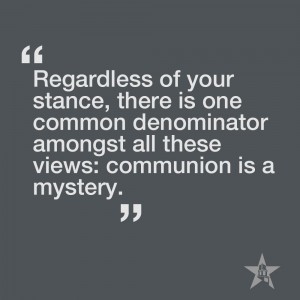Whoever, therefore, eats the bread or drinks the cup of the Lord in an unworthy manner will be guilty concerning the body and blood of the Lord. Let a person examine himself, then, and so eat of the bread and drink of the cup. For anyone who eats and drinks without discerning the body eats and drinks judgment on himself.
The above passage is taken from St. Paul’s letter to the Corinthians, chapter 11, verses 27-29. To give a brief summary of this passage, St. Paul is writing to the Corinthians reprimanding them for things they’re doing wrong, one of which is communion.
 I have attended a wide range of churches throughout the course of my life. This is not to say that I understand each and every one of their doctrines, but simply to say that I have had decent amount of exposure. I attended a Catholic school for a little over a decade; simultaneously I attended an Assemblies of God church, followed by a nondenominational church. Interspersed in all this was a Baptist church and getting into the Vineyard movement. For a few years I also joined a Mennonite congregation and now I finally—for the time being—settle in the Wesleyan Church. One thing that is constant in all these churches is the practice of communion, also known as Holy Communion, the Lord’s Supper, the Eucharist, the breaking of bread and the divine service, all referring to the eating of the bread and drinking of the wine in remembrance of Christ’s ultimate sacrifice for our salvation.
I have attended a wide range of churches throughout the course of my life. This is not to say that I understand each and every one of their doctrines, but simply to say that I have had decent amount of exposure. I attended a Catholic school for a little over a decade; simultaneously I attended an Assemblies of God church, followed by a nondenominational church. Interspersed in all this was a Baptist church and getting into the Vineyard movement. For a few years I also joined a Mennonite congregation and now I finally—for the time being—settle in the Wesleyan Church. One thing that is constant in all these churches is the practice of communion, also known as Holy Communion, the Lord’s Supper, the Eucharist, the breaking of bread and the divine service, all referring to the eating of the bread and drinking of the wine in remembrance of Christ’s ultimate sacrifice for our salvation.
I have always been fascinated by how different churches conduct communion. Regardless of the church you attend, this practice is pretty much guaranteed to take place within the walls of a Christian institution. And of course as with any Christian practice, it varies from church to church. Some uphold the doctrine of transubstantiation whereby the bread and wine literally transform into the flesh and blood of Christ while others uphold the doctrine of Consubstantiation whereby the blood and body of Christ are present alongside the bread and wine which remain present—think of red hot iron, where fire is joined with iron yet both retain their distinct elements—and lastly (for the purpose of this editorial) we have the memorialists who take on a more simplistic approach and that is that the bread and wine symbolize and remind us of the sacrifice Christ made on our behalf.
Not only do churches hold differing opinions on what exactly happens to the elements during communion, they also differ in how and to whom it is administered. Some churches I have attended reserved communion exclusively for members of their particular denomination, other churches request that only those that have been baptized by immersion partake in the Lord’s supper, and others allow everyone who sets foot in their church to partake, regardless of their affiliation, commitment, age, etc.
I would like to clarify that I by no means see myself as anything other than a layman. I have not studied the original text, nor have I had any training in biblical interpretation other than the basic introductory classes required by Houghton College. So I will not attempt to pick apart these doctrines. What I will say is that regardless of your stance, there is one common denominator amongst all these views: communion is a mystery. Whether you believe that there is a physical transformation occurring, a metaphysical change, or just plain remembering the death and resurrection, there is a component that cannot be explained in human terms and therefore we deem it to be sacred.
What St. Paul is reprimanding the Corinthians for is not a faulty belief regarding the practice of communion. He is getting after them for trivializing the practice. If I am honest with myself, I have to confess that I have never put much thought into what I was doing when communion was served. For kids it is nothing more than a mid-service snack, and unfortunately for many adults it isn’t much more either.
A few weeks ago during a Sunday morning service communion was served. I had not been feeling particularly well; I was not where I needed to be in my relationship with God and various people in my life. I knew there was a lot of sin in my life that had not been dealt with. As the pastor invited people to come receive the elements I noticed an array of people go up. The passage that I opened with struck me. If I were to get up and take these elements without examining myself I would be eating and drinking a judgment on myself because I would be trivializing what they represent.
Leaving aside the details of the various doctrines, we take communion for the purpose of commemorating the most sacred act, the death and resurrection of Christ. To go through these motions of eating the bread and drinking the wine without fully understanding their meaning is to in essence mock the sacrifice Christ made by trivializing this sacred act.
